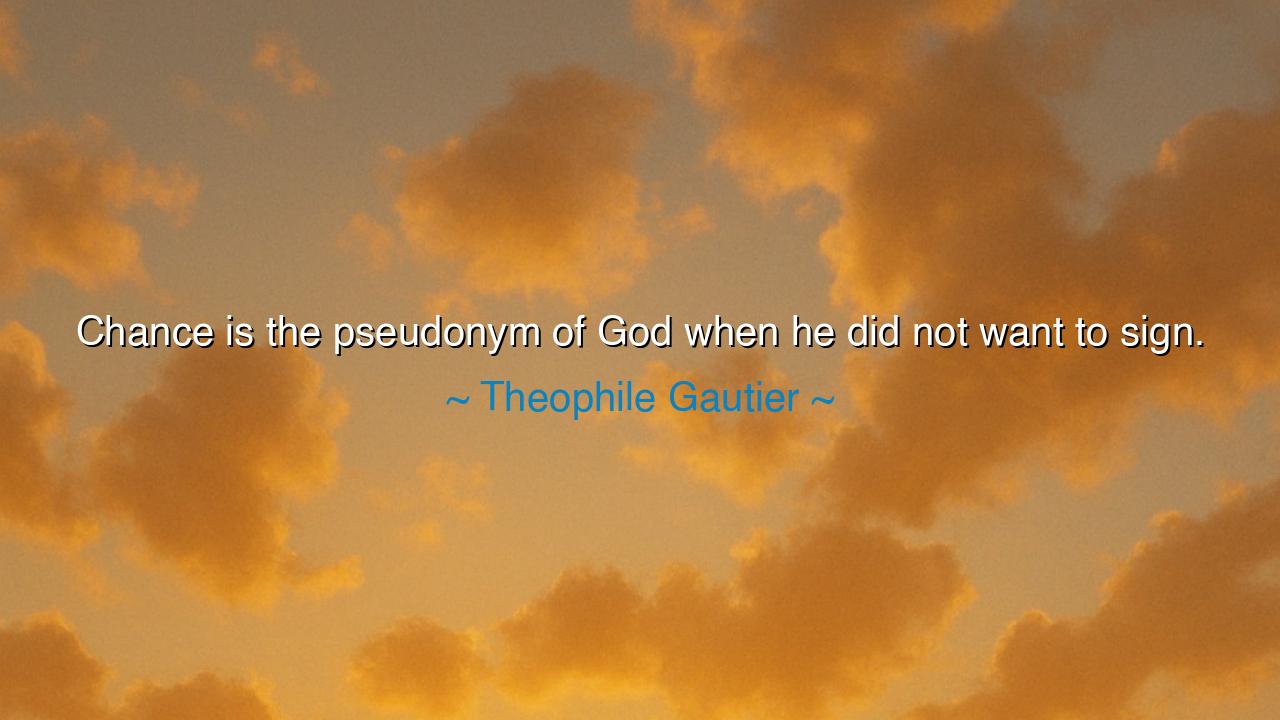
Chance is the pseudonym of God when he did not want to sign.






In the profound words of Théophile Gautier, "Chance is the pseudonym of God when he did not want to sign," we are invited to contemplate the mysterious nature of fate and the hidden hand of the divine in the everyday occurrences of life. Gautier, in his characteristic style, challenges us to see chance not as mere randomness or accident, but as a vessel through which the will of the divine is subtly expressed. The "pseudonym" of God, in this sense, suggests that what we often attribute to luck or coincidence is, in truth, the working of a higher force, a divine hand that operates in ways beyond our understanding. Chance, then, becomes not an impersonal force but a disguised messenger of destiny, guiding us in ways we cannot always see or comprehend.
This idea echoes the ancient wisdom of the Greeks, who believed in the concept of Moira, or the unalterable destiny that each person was born into. The Greeks understood that life’s events, while they appeared to happen by mere chance, were in fact the work of the gods, who wove the tapestry of human lives with a purpose beyond human comprehension. In the Iliad, Homer writes about the fate of warriors and the seemingly random nature of their deaths, yet he implies that the gods were not absent, but rather present in every moment of fate. Gautier’s words align with this ancient understanding: what we call chance is often a manifestation of the divine, guiding us toward our ultimate purpose, though we may not always recognize it.
Consider the life of Alexander the Great, a man whose conquests and achievements often seemed the result of sheer luck. Yet, historians have also noted the divine signs that appeared throughout Alexander’s journey. From the auguries of birds to his belief in his own divine heritage, Alexander saw fate as something that operated through unseen forces. The victory at the Battle of Gaugamela, which secured his position as ruler of the Persian Empire, appeared to be a military triumph, but Alexander himself often spoke of the gods playing a role in his success. Like Gautier’s suggestion of divine intervention masked as chance, Alexander’s life was marked by moments where fortune and fate seemed to coincide—the will of the gods, though not signed explicitly, was made clear through the events of his journey.
In more recent times, we see a similar theme in the story of Marie Curie, whose groundbreaking work in radioactivity led her to become the first woman to win the Nobel Prize. Curie’s discovery was not simply the result of a scientific breakthrough but was influenced by what some might call chance encounters—the discovery of radium and polonium, and the unexpected paths her research took her down. Yet, Curie, much like Alexander, believed that her work was aligned with a higher calling. Chance had given her the opportunity to transform science, but it was her own determination and willingness to embrace the unknown that allowed her to harness it for the good of humanity. Like Gautier’s suggestion that God works through chance, Curie’s life reminds us that moments of randomness can hold immense potential when we approach them with purpose and commitment.
The lesson here is clear: we must not look at chance with cynicism, nor dismiss it as mere coincidence. Instead, we should approach life’s unpredictable moments with a sense of reverence and curiosity, recognizing that behind every random event, there may lie a divine purpose. Fate, as Gautier suggests, is often veiled in the unexpected, and it is through accepting these moments, rather than fighting them, that we are led to our destiny. Like the heroes of old, whether they were warriors or scientists, we must remain open to the possibility that chance is not a force of chaos but a channel through which the divine can speak.
Thus, let us take action by approaching life with a sense of openness to the unexpected. When we face what seems like random events or encounters, let us reflect on the possibility that these moments are not devoid of meaning, but are instead part of a larger, divine plan. Like Gautier’s assertion, let us see chance not as an enemy, but as a manifestation of a higher purpose, guiding us towards greater understanding and fulfillment. Life may not always be signed with clarity, but it is in the moments of uncertainty that we often find our truest path.






AAdministratorAdministrator
Welcome, honored guests. Please leave a comment, we will respond soon